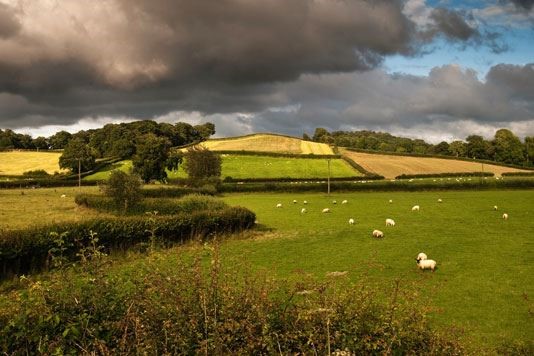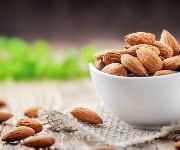Everything you should know about organic food

What are the rules for organic farming? Is eating organic produce the healthy option? And are the animals treated better? Matt Brady finds out.
Organic food is a booming business. But although most of us vaguely understand that organic cows are treated better than non-organic cows, few know what the word 'organic' really means. Let's take a look at the idea in detail...
Organic food is big business
Organic produce hit its peak in popularity during 2008, but sales have actually decreased by 33% since then. This doesn’t mean that consumer taste for ‘ethical’ products has waned – quite the opposite in fact, with its share of household food sales standing at 8.5% in 2012 (the most recent figure available).
The main reason for the trend is that competing ‘ethical’ products such as Fairtrade and the Rainforest Alliance have expanded their market shares dramatically over the past six or seven years. But the UK’s organic market is still worth the tidy sum of £1.79 billion in sales, and grew by 2.8% in 2013.
Different definitions of 'organic'
 The objectives laid down by EU Council Regulation 834/2007 state that the term “organic” relates to agriculture which establishes a sustainable system, respecting “nature’s systems and cycles” and “high animal welfare standards.”
The objectives laid down by EU Council Regulation 834/2007 state that the term “organic” relates to agriculture which establishes a sustainable system, respecting “nature’s systems and cycles” and “high animal welfare standards.”
The Soil Association (SA) is one of the registered bodies that certifies organic food, but in terms of managing livestock it lays down standards that are “often stricter” than welfare codes set down in legislation. Other registered bodies in the UK include DEFRA and Organic Farmers and Growers.
Holly Black of the SA informs me that they have “the most comprehensive rules,” and in fact the SA’s standards predate the EU legislation. The latter is actually “heavily informed” by “private standards” (such as those of the SA) and the guidelines developed by the International Federation of Organic Agriculture Organisations.
The SA’s standards have developed over time as “more of a statement of the way forward rather than a critique of the EU legislation," according to Holly.
SA standards demand, among other things:
- No factory farming
- Lots of outdoor space and fresh air
- Encouragement of normal animal behaviour
- Minimised stress in transport and slaughter
They also provide farmers with a range of ‘best practice’ targets (marked in green in this document) to aim for, regarding sustainability and animal welfare.
Environmental benefits
 The Soil Association believes that healthy soil equals healthy humans – because the more nutrients there are in the soil, the more plants can take up. We therefore consume vegetables at their most nutritious, they reason, when they're grown on organic farms.
The Soil Association believes that healthy soil equals healthy humans – because the more nutrients there are in the soil, the more plants can take up. We therefore consume vegetables at their most nutritious, they reason, when they're grown on organic farms.
Because organic farmers don’t use synthetic fertilisers, there are strong arguments that groundwater courses near organic farms are less polluted, and a well managed organic system will enhance soil structure and water infiltration. Organic farms also encourage biodiversity by using crop species during rotations that aren’t common choice for farmers. This can help create a healthier gene pool and attract beneficial new species who play key roles in the surrounding ecosystem (like pest predators and pollinators).
It’s all in the taste
The Organic Trade Association (OTA), a US trade body, says on their website that “organic food tastes great!” And while I don’t doubt that, most non-organic food tastes great too. The real question is, does it taste any better?
In a blind test, we got tasters to say which product (organic or non-organic) they preferred. The results may surprise you.
Criticisms of organic food
The restricted use of antibiotics in organic farming have led to food poisoning fears, as manure contains higher levels of microbes on organic farms. But the SA argues that any manure spread on certificated farms will previously have been composted, ensuring the death of harmful microbes like E.coli, before use.
In fact, the SA criticises conventional practices where antibiotics are used for disease prevention, rather than for treating an actual illness. In these cases, the dosages are generally far less than those given to animals who are actually ill. Doling out regular antibiotics like this means that animals are less likely to develop resistances to diseases on their own, and that bacteria will become more resistant to the treatment; an outcome that's less desirable than safely composted manure.
Buying organic food also tends to empty your wallet fairly quickly. Is it really worth the extra cash? For example, an organic egg is at least 10p extra than its free range counterpart; organic carrots cost around 60p more per kilo than non-organic carrots; and organic meatballs are £3 more per 100g than non-organic (prices may vary depending on where you shop).
It’s worth noting that organic isn’t always more expensive though.
Health benefits – are they real?
 What about the purported health benefits? The OTA also says that “organic production reduces health risks.”
What about the purported health benefits? The OTA also says that “organic production reduces health risks.”
Some studies do suggest that yes, there can be benefits. Benbrook et al found that organic milk contained 25% less omega-6 fatty acids and 62% more omega-3 fatty acids than conventional milk. This would be good for human consumption, as the researchers observed that the intake ratios of the two had risen to “nutritionally undesirable levels.”
And research by Reganold et al found that when growing 13 pairs of strawberries, the organic strawberries had higher levels of antioxidants and vitamin C. They also didn't rot as quickly as their non-organic counterparts.
Another study undertaken by Virginia Worthington in The Journal of Alternative and Complementary Medicine found that there appeared to be “genuine differences in the nutrient content of organic and conventional crops,” but that journal has been labelled by QuackWatch.com as "fundamentally flawed". Not all of the research into the health benefits of organic food is reliable, and in fact QuackWatch insists that "except for their high price, [organic foods] are not significantly different."
A 2010 review of research into the nutrition-related health effects of organic foods found that there simply wasn’t enough research at the time to make any solid conclusions.
Alternative ‘ethical’ products
 Organic might not appeal if cost is a big factor for you, but there are other cheaper (generally) 'ethical' schemes out there that will at least satisfy the animal welfare aspect of the debate.
Organic might not appeal if cost is a big factor for you, but there are other cheaper (generally) 'ethical' schemes out there that will at least satisfy the animal welfare aspect of the debate.
The Freedom Food scheme was set up in 1994 to improve the welfare of animals farmed for food. They say it has improved the lives of over 600m animals and that Freedom Food has been on the cutting edge of developments in farm animal welfare over the past two decades.
It's a separate charity to the RSPCA, and only gives its approval to meat products where animals have been treated in strict accordance with the RSPCA's welfare standards.
If you’d be up for putting a bit of legwork in, you could get involved in a Community Supported Agriculture project, in which you might be able to grow your own veg or raise your own animals – in which case you’d know exactly what had gone into your meals.
Eating this local food also means that food doesn’t have to be shipped a long way to reach you, which has a beneficial environmental impact. Read all about CSAs here.
This is a classic lovefood.com article
What's your take on organic food? Do you buy it and if so, why? Or do you plump for one of the other 'ethical' schemes out there? Share your views in the comments box below.
You might also like:
Taste test: organic v non-organic
Most Recent
Comments
Be the first to comment
Do you want to comment on this article? You need to be signed in for this feature








